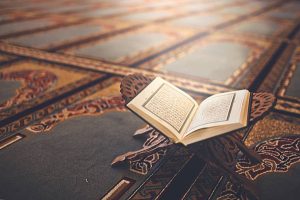
Duas and Azkaar Before Sleeping
Dua One
اَللّٰهُمَّ بِاسْمِكَ أَمُوْتُ وَأَحْيٰى
O Allah Ta‘ala, with Your name do I die and live. [1]
Dua Two
اَللّٰهُمَّ قِنِيْ عَذَابَكَ يَوْمَ تَبْعَثُ عِبَادَكَ
O Allah Ta‘ala, save me from Your punishment on the day when You will raise Your servants (from the grave).
Note: Rasulullah (sallallahu ‘alaihi wasallam) would recite this dua thice.[2]
Dua Three
اَلْحَمْدُ لِلّٰهِ الَّذِيْ أَطْعَمَنَا وَسَقَانَا وَكَفَانَا وَآوَانَا فَكَمْ مِمَّنْ لَا كَافِيَ لَهُ وَلَا مُؤْوِيَ
All praises are due to Allah Ta‘ala, who gave us food, drink, fulfilled our needs and gave us shelter. There are many who do not have anyone to support them, nor anyone to provide them with shelter.[3]
Dua Four
أَسْتَغْفِرُ اللهَ الَّذِيْ لَا إِلٰهَ إِلَّا هُوَ الْحَيُّ الْقَيُّوْمُ وَأَتُوْبُ إِلَيْهْ
I beg forgiveness from Allah Ta‘ala, the One besides whom there is none worthy of worship, who is Ever-Living, the Maintainer of everything that exists, and I turn to Him in repentance.
Note: The virtue of reciting this dua is that all one’s minor sins will be forgiven.
Hazrat Abu Sa’eed (radhiyallahu ‘anhu) reports that Hazrat Rasulullah (sallallahu ‘alaihi wasallam) said, “The one who recites the abovementioned istighfaar thrice before sleeping, Allah Ta‘ala will forgive his (minor) sins, even if they are as abundant as the foam on the ocean, the leaves on the tress, the grains of sand in Aalij (a place in the desert that contains abundant heaps of sand), and the days of the dunya.[4]
Dua Five
بِاسْمِكَ رَبِّ وَضَعْتُ جَنْبِيْ وَبِكَ أَرْفَعُهُ إِنْ أَمْسَكْتَ نَفْسِيْ فَارْحَمْهَا وَإِنْ أَرْسَلْتَهَا فَاحْفَظْهَا بِمَا تَحْفَظُ بَهِ عِبَادَكَ الصَّالِحِيْنَ
With Your name, O my Rabb, I place my side (on the bed), and with You (i.e. Your name and help) I raise it (on awakening). If You take my soul (in my sleep) then show it mercy, and if you leave it (i.e. allow me to awaken alive) then protect it (from falling into sin) with that (special protection and tawfeeq) through which You protect Your pious servants.[5]
Dua Six
اَللّٰهُمَّ خَلَقْتَ نَفْسِيْ وَأَنْتَ تَوَفَّاهَا لَكَ مَمَاتُهَا وَمَحْيَاهَا إِنْ أَحْيَيْتَهَا فَاحْفَظْهَا وَإِنْ أَمَتَّهَا فَاغْفِرْ لَهَا اَللّٰهُمَّ إِنِّيْ أَسْأَلُكَ الْعَافِيَةْ
O Allah Ta‘ala! You created my soul, and you will take it. For You alone is its dying and living. If you allow it to live (after sleeping) then protect it (from falling into sin), and if you cause it to die then forgive it. O Allah Ta‘ala! I ask you for aafiyah (comfort and ease).[6]
Dua Seven
اَللّٰهُمَّ رَبَّ السَّمَاوَاتِ وَرَبَّ الْأَرْضِ وَرَبَّ الْعَرْشِ الْعَظِيْمِ رَبَّنَا وَرَبَّ كُلِّ شَيْءٍ فَالِقَ الْحَبِّ وَالنَّوٰى وَمُنْزِلَ التَّوْرَاةِ وَالْإِنْجِيْلِ وَالْفُرْقَانِ أَعُوْذُ بِكَ مِنْ شَرِّ كُلِّ شَيْءٍ أَنْتَ آخِذٌ بِنَاصِيَتِهِ اَللّٰهُمَّ أَنْتَ الْأَوَّلُ فَلَيْسَ قَبْلَكَ شَيْءٌ وَأَنْتَ الْآخِرُ فَلَيْسَ بَعْدَكَ شَيْءٌ وَأَنْتَ الظَّاهِرُ فَلَيْسَ فَوْقَكَ شَيْءٌ وَأَنْتَ الْبَاطِنُ فَلَيْسَ دُوْنَكَ شَيْءٌ اِقْضِ عَنَّا الدَّيْنَ وَأَغْنِنَا مِنَ الْفَقْرِ
O Allah Ta‘ala! Rabb of the heavens, Rabb of the earth, Rabb of the magnificent throne, our Rabb and Rabb of everything! The One who splits open the grain and the seed, and the One who sent down the Tawraah, Injeel and Furqaan (the Quraan Majeed). I seek protection in You from the evil of everything which you grip by the forelock. O Allah Ta‘ala! You are the First, so there was nothing before You, and You are the last, so there will be nothing after You, and You are the Most-Apparent (through Your signs), so there is nothing above You (in being apparent), and You are the Most-Hidden, so there is nothing below you (i.e. nothing more hidden than you). Settle our debts and enrich us from poverty.[7]
Dua Eight
اَلْحَمْدُ لِلّٰهِ الَّذِيْ كَفَانِيْ وَآوَانِيْ وَأَطْعَمَنِيْ وَسَقَانِيْ وَالَّذِيْ مَنَّ عَلَيَّ فَأَفْضَلَ وَالَّذِيْ أَعْطَانِيْ فَأَجْزَلَ اَلْحَمْدُ لِلّٰهِ عَلٰى كُلِّ حَالٍ اَللّٰهُمَ رَبَّ كُلِّ شَيْءٍ وَمَلِيْكَهُ وَإِلٰهَ كُلِّ شَيْءٍ أَعُوْذُ بِكَ مِنَ النَّارْ
All praise is due to Allah Ta‘ala who sufficed me (of all my needs), granted me shelter, fed me and provided me with drink, and who favoured me with bounties and increased me (compared to others in His bounties), and who blessed me with great bounties and caused these great bounties to increase me. All praise is for Allah Ta‘ala in every condition. O Allah Ta‘ala, the Rabb of everything, the Complete Owner of everything and the God of everything, I seek protection in You from the fire of Jahannum.[8]
Dua Nine
اَللّٰهُمَّ أَسْلَمْتُ نَفْسِيْ إِلَيْكَ وَفَوَّضْتُ أَمْرِيْ إِلَيْكَ وَوَجَّهْتُ وَجْهِيْ إِلَيْكَ وَأَلْجَأْتُ ظَهْرِيْ إِلَيْكَ رَغْبَةً وَرَهْبَةً إِلَيْكَ لَا مَلْجَا وَلَا مَنْجَا مِنْكَ إِلَّا إِلَيْكَ آمَنْتُ بِكِتَابِكَ الَّذِيْ أَنْزَلْتَ وَبِنَبِيِّكَ الَّذِيْ أَرْسَلْتَ
O Allah Ta‘ala! I submit myself before You! I entrust my affair to You, and I turn my face (and heart) towards You, and I rely upon You (i.e. I take support from Your protection), out of hope and desire (for reward) and out of fear (for Your punishment). There is no place of sanctuary or salvation from You (i.e. Your punishment) except towards You (i.e. except towards Your mercy). I bring Imaan in Your kitaab which You have revealed, and in Your Nabi whom You have sent.[9]
Note: If one recites this dua before sleeping, and then passes away while asleep, then one will pass away on fitrah (i.e. on the path of Islam).
Dua Ten
لَا إِلٰهَ إِلَّا اللهُ وَحْدَهُ لَا شَرِيْكَ لَهُ لَهُ الْمُلْكُ وَلَهُ الْحَمْدُ وَهُوَ عَلٰى كُلِّ شَيْءٍ قَدِيْرٌ وَلَا حَوْلَ وَلَا قُوَّةَ إِلَّا بِاللهِ سُبْحَانَ اللهِ وَبِحَمْدِهِ لَا إِلٰهَ إِلَّا اللهُ وَاللهُ أَكْبَرُ
There is none worthy of worship besides Allah Ta‘ala alone. He has no partner. For Him alone belongs the kingdom and to Him alone belongs all praise, and He has complete control over everything, and there is no power (to refrain from sin) and no strength (to carry our righteous actions) except through Allah Ta‘ala. Glory be Allah Ta‘ala with His praise! There is none worthy of worship besides Allah Ta‘ala, and Allah Ta‘ala is the Greatest.[10]
Note: Through reciting this dua before sleeping, all one’s minor sins will be forgiven, even if they are as abundant as the foam on the ocean.
Dua Eleven
اَللّٰهُمَّ اغْفِرْ لِيْ وَاخْسَأْ شَيْطَانِيْ وَفُكَّ رِهَانِيْ وَثَقِّلْ مِيْزَانِيْ وَاجْعَلْنِيْ فِيْ النَّدِيِّ الْأَعْلٰى
O Allah Ta‘ala! Forgive me, repel my Shaitaan (from harming me), and set me free (from the shackles of sins), and make my scale (of good deeds) heavy (on the day of Qiyaamah), and cause me to be among the high assembly (of Your pious servants and the angels).[11]
Recite the following before retiring to bed:
a) Tasbeeh-e-Faatimi i.e. 33 times Subhaanallah, 33 times Alhamdulillah, and 34 times Allahu Akbar.
عن ابن أبي ليلى حدثنا علي أن فاطمة عليهما السلام أتت النبي صلى الله عليه وسلم تشكو إليه ما تلقى في يدها من الرحى وبلغها أنه جاءه رقيق فلم تصادفه فذكرت ذلك لعائشة فلما جاء أخبرته عائشة قال: فجاءنا وقد أخذنا مضاجعنا فذهبنا نقوم فقال: على مكانكما فجاء فقعد بيني وبينها حتى وجدت برد قدميه على بطني فقال: ألا أدلكما على خير مما سألتما؟ إذا أخذتما مضاجعكما أو أويتما إلى فراشكما فسبحا ثلاثا وثلاثين واحمدا ثلاثا وثلاثين وكبرا أربعا وثلاثين فهو خير لكما من خادم (صحيح البخاري، الرقم: ٥٣٦١)
Hazrat Ali (radhiyallahu ‘anhu) reports: On one occasion, Faatimah (radhiyallahu ‘anha) went to the house of Rasulullah (sallallahu ‘alaihi wasallam) to complain about the difficulty she was experiencing while using the hand mill. The news reached her that Rasulullah (sallallahu ‘alaihi wasallam) had received some slaves (so she had thought of requesting Rasulullah (sallallahu ‘alaihi wasallam) for a slave to assist her in her daily chores). However, (upon reaching the home,) she did not find Rasulullah (sallallahu ‘alaihi wasallam) present, hence she informed Aaishah (radhiyallahu ‘anha) of the reason for her visit. When Rasulullah (sallallahu ‘alaihi wasallam) reached home, Aaishah (radhiyallahu ‘anha) informed him regarding the request of Faatimah (radhiyallahu ‘anha). Subsequently, Rasulullah (sallallahu ‘alaihi wasallam) came to our home when we were retiring to bed. (Upon seeing him,) we intended to wake up (out of respect for him), but Rasulullah (sallallahu ‘alaihi wasallam) told us to remain as we were. He then came and sat between us, until I could feel the coolness of his feet on my stomach (i.e. due to him being between us and so close to us, his mubaarak feet touched the side of my body). He then said, “Should I not show you something better than what you had requested (i.e. better than a slave to assist you in your daily chores)? Before retiring to bed, recite Subhaanallah 33 times, Alhamdulillah 33 times and Allahu Akbar 34 times, for certainly this is better for you (in assisting you in your daily chores) than acquiring a slave.” (According to another narration,) Hazrat Ali (radhiyallahu ‘anhu) further said, “I did not leave out this practice from the time I heard it from Rasulullah (sallallahu ‘alaihi wasallam).” Someone present asked, “Not even on the night of Siffeen (i.e. the night of the Battle of Siffeen)?” He replied, “Not even on the night of Siffeen.”
b) Aayatul Kursi
قال: سمعت أبا أمامة يقول: قال رسول الله صلى الله عليه وسلم: من قرأ آية الكرسي دبر كل صلاة مكتوبة لم يمنعه من دخول الجنة إلا الموت (المعجم الكبير للطبراني، الرقم: ٧٥٣٢)[12]
Hazrat Abu Umaamah (radhiyallahu ‘anhu) reports that Hazrat Rasulullah (sallallahu ‘alaihi wasallam) said, “Whoever recites Aayatul Kursi after every fardh salaah, nothing prevents him from entering Paradise except death. (In another Hadith reported by Hazrat Ali (radhiyallahu ‘anhu), Hazrat Rasulullah (sallallahu ‘alaihi wasallam) said,) the one who recites Aayatul Kursi at night when retiring to bed, Allah Ta‘ala will protect his home, the homes of his neighbours, and the homes of the people around him.”
c) The three Quls
عن عائشة: أن النبي صلى الله عليه وسلم كان إذا أوى إلى فراشه كل ليلة جمع كفيه ثم نفث فيهما فقرأ فيهما: قل هو الله أحد وقل أعوذ برب الفلق وقل أعوذ برب الناس ثم يمسح بهما ما استطاع من جسده يبدأ بهما على رأسه ووجهه وما أقبل من جسده يفعل ذلك ثلاث مرات (صحيح البخاري، الرقم: ٥٠١٧)
Hazrat Aaishah (radhiyallahu ‘anha) reports that when Rasulullah (sallallahu ‘alaihi wasallam) would retire to bed every night, he would recite Surah Ikhlaas, Surah Falaq and Surah Naas and thereafter blow on both his palms. Subsequently, he would rub his palms upon his entire body. He would commence rubbing his palms on his head, face and the front portion of his body. He would repeat this action three times.
d) The last two verses of Surah Baqarah (i.e. from Aamanar Rasoolu until the end).
عن أبي مسعود الأنصاري قال: قال النبي صلى الله عليه وسلم: الآيتان من آخر سورة البقرة من قرأ بهما في ليلة كفتاه ( صحيح البخاري، الرقم: ٥٠٤٠)
Hazrat Abu Mas’ood Ansaari (radhiyallahu ‘anhu) reports that Hazrat Rasulullah (sallallahu ‘alaihi wasallam) said, “The last two verses of Surah Baqarah are such that whoever recites them at night, it will suffice him (some Ulama explain that it will suffice him from the harm and evil of everything, while other Ulama explain that it will suffice him from reciting anything else during the night or from awaking for Tahajjud).”
e) One should recite Surah Kaafiroon and Surah Faatihah.[13]
Note: Before retiring to bed at night, one should recite Surah Mulk, Surah Sajdah, Surah Waaqi’ah and Surah Yaaseen. On Thursday night, one should recite Surah Dukhaan and Surah Kahf (Surah Kahf can also be recited on Friday).[14]
[1] صحيح البخارى، الرقم: ٦٣١٤
[2] السنن الكبرى للنسائي، الرقم: ١٠٥٣٠، وسنده صحيح كما في الفتح ١١٥/١١
[3] صحيح مسلم، الرقم: ٢٧١٥
[4] سنن الترمذي، الرقم: ٣٣٩٧، وقال: هذا حديث غريب لا نعرفه إلا من هذا الوجه من حديث الوصافي عبيد الله بن الوليد
[5] صحيح البخاري، الرقم: ٦٣٢٠
[6] صحيح مسلم، الرقم: ٢٧١٢
[7] صحيح مسلم، الرقم: ٢٧١٣
[8] سنن أبي داود، الرقم: ٥٠٥٨، وسكت عنه هو والمنذري
[9] صحيح البخاري، الرقم: ٦٣١٣
[10] السنن الكبرى للنسائي، الرقم: ١٠٥٧٨، وقال الحافظ في نتائج الأفكار ١١٧/١: هذا حديث حسن
[11] المستدرك للحاكم، الرقم: ١٩٨٢، عن أبي الأزهر الأنماري أن رسول الله صلى الله عليه وسلم كان إذا أخذ مضجعه من الليل قال: بسم الله وضعت جنبي اللهم اغفر لي ذنبي وأخسأ شيطاني وفك رهاني واجعلني في الندي الأعلى (سنن أبي داود، الرقم: ٥٥٣٤، وسكت عليه هو والمنذري)
[12] وقال المنذري في الترغيب والترهيب، الرقم: :٢٤٦٨ رواه الطبرابي بأسانيد أحدها صحيح
[13] عن فروة بن نوفل عن أبيه أن النبي صلى الله عليه وسلم قال لنوفل: اقرأ قل يا أيها الكافرون ثم نم على خاتمتها فإنها براءة من الشرك (سنن أبي داود، الرقم: ٥٠٥٥ وقال الحافظ في نتائج الأفكار (٦١/٣): هذا حديث حسن)
عن أنس قال: قال رسول الله صلى الله عليه وسلم: إذا وضعت جنبك على الفراش وقرأت فاتحة الكتاب و )قل هو الله أحد ( فقد أمنت من كل شيء إلا الموت (مسند البزار، الرقم: ٧٣٩٣، وقال العلامة الهيثمي رحمه الله في (مجمع الزوائد، الرقم: ١٧٠٣٠: رواه البزار وفيه غسان بن عبيد وهو ضعيف ووثقه ابن حبان وبقية رجاله رجال الصحيح)
[14] عن جابر قال كان النبي صلى الله عليه وسلم لا ينام حتى يقرأ بتنزيل السجدة وبتبارك (سنن الترمذي، الرقم: ٣٤٠٤، وقال الصنعاني في التنوير (٥١١/٨): رمز المصنف لصحته
عن جندب قال: قال رسول الله صلى الله عليه وسلم: من قرأ يس في ليلة ابتغاء وجه الله غفر له (صحيح ابن حبان، الرقم:٢٥٧٤)
عن أبي هريرة رضي الله عنه عن النبي صلى الله عليه وسلم قال: من قرأ سورة الدخان في ليلة جمعة أصبح مغفورا له (عمل اليوم والليلة لابن السني، الرقم: ٦٧٩، قال الحافظ في نتائج الأفكار (٢٥٩/٣): أخرجه ابن السني من رواية مصعب بن المقدام عن أبي المقدام عن الحسن عن أبي هريرة وأبو المقدام اسمه هشام بن زياد ضعيف)
عن سهل بن معاذ عن أبيه عن رسول الله صلى الله عليه وسلم أنه قال من قرأ أول سورة الكهف وآخرها كانت له نورا من قدمه إلى رأسه ومن قرأها كلها كانت له نورا ما بين السماء إلى الأرض (مسند أحمد، الرقم: ١٥٦٢٦، وقال العلامة الهيثمي رحمه الله في مجمع الزوائد ٥٢/٧: رواه أحمد والطبراني وفي إسناد أحمد ابن لهيعة وهو ضعيف وقد يحسن حديثه)
أن ابن مسعود رضي الله عنه قال: سمعت رسول الله صلى الله عليه وسلم يقول: من قرأ سورة الواقعة في كل ليلة لم تصبه فاقة أبدا قال: وقد أمرت بناتي أن يقرأنها كل ليلة (عمل اليوم والليلة لإبن السني، الرقم: ٦٨٠، شعب الإيمان للبيهقي، الرقم: ٢٢٦٩) وقال المباركفوري في مرعاة المفاتيح ٢٥٥/٧: وحديث ابن مسعود أخرجه أيضاً ابن السني ونسبه السيوطي في الإتقان للبيهقي والحارث ابن أبي أسامة وأبي عبيد وإسناد ابن السني حسن)
 Ihyaaud Deen An Effort to Revive Deen in Totality
Ihyaaud Deen An Effort to Revive Deen in Totality



